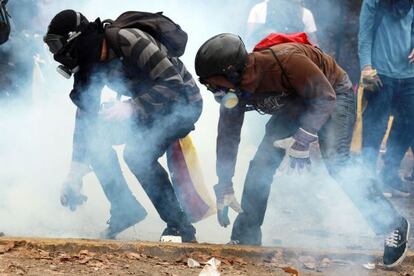Maduro creates human rights panel
Violent protests continue in Caracas as police clash with students

Faced with harsh criticism from the Catholic Church and international rights organizations, Venezuelan President Nicolás Maduro announced Thursday the creation of a special human rights panel that will look into charges of abuse against opposition groups.
Maduro’s decision comes one day after Catholic Church leaders warned that the government was fomenting repression by cracking down on demonstrators who have taken to the streets over the past two months to protest the country’s spiraling economy, soaring crime rates, and food shortages.
Taking a different stance than his predecessor, the late Hugo Chávez, who would often insult Catholic bishops and ignore their recommendations, Maduro said he is willing to act on the concerns expressed on Wednesday by the religious leaders.
He said that a mission from the Union of South American Nations (Unasur) made up of foreign ministers who traveled to Caracas last week had made a recommendation that a rights commission be empaneled.
Maduro said he is willing to act on the concerns expressed on Wednesday by the religious leaders
During a three-hour televised address, Maduro explained that Vice President Jorge Arreza will preside over the commission, which will include the defense and interior ministers and the heads of civic organizations. In all 15 people will be appointed to the panel, which will be advised “by a group of experts” from Unasur, he said.
Concerns about the growing number of complaints of torture and abuses by law enforcement authorities compelled the Attorney General’s Office to open up at least 81 investigations, most of them into allegations that anti-riot police officers have attacked protestors and students during the demonstrations.
At least 39 people have died in the unrest since the nationwide protests began on February 12; some 600 others have reportedly been injured and police have made more than 1,200 arrests.
For now, there are no signs of the unrest subsiding. On Thursday, a large group of students was prevented from marching from Central University (UCV) in the heart of Caracas to the headquarters of the state-owned petroleum firm, Petroleos de Venezuela (Pdvsa), in the eastern part of the city. The students were demanding that Pdvsa President Jorge Rodríguez help resolve the shortage problems and economic crisis.
Students demanded that Pdvsa President Jorge Rodríguez help resolve the shortage problems
Venezuela relies heavily on its petroleum exports for financing.
Police held back the students by firing tear gas canisters and water hoses. Rubber bullets were also used against the demonstrators.
At the same time, armed citizens groups, which support the Maduro government, also attacked the students from inside the UCV campus. At least six journalists were also beaten by the vigilante groups.
On Friday, the protests continued with a march organized in La Boyera, an affluent district in southeast Caracas, and a rally held in Brión square to demand the release of opposition leader Leopoldo López, who has been in military custody since his arrest on February 18.







































